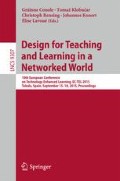Abstract
Informal learning in online knowledge communities (OKCs) comprises visitor inquiries on specific topics. Learning can occur only if the OKC adequately respond. This study aims to predict OKC response, using a social learning analytics approach based on computational linguistics and Bakhtin’s theory of dialogism. Observing the blog topic (cooking vs. politics & economics) and the visitor inquiry format (off-topic vs. on-topic), a field experiment with a 2 × 2 factorial design was conducted on a sample of N = 68 blogger communities with a total of 25,303 members. For the entire sample, the community response was influenced only by the inquiry format. In a separate examination of experimental groups, only for one examined topic (cooking) this remained true, while for the other (politics & economics) the community response only depended on the previously established dialog quality. The findings suggest identification criteria for responsive communities, which can support OKC integration in learning environments.
References
Baker, R., Siemens, G.: Educational data mining and learning analytics. In: Sawyer, K. (ed.) Cambridge handbook of the learning sciences. Cambridge University Press, Cambridge (in press) (2014)
Nistor, N., Dascălu, M., Tarnai, C., Bresser, N., Trăuşan-Matu, S.: Online knowledge communities as student-centered open learning environments: how likely will they be to integrate learners as new members? In: 11th International Conference on Computer-Supported Collaborative Learning (CSCL 2015). ISLS, Gothenburg, Sweden (in press) (2015)
Bereiter, C., Scardamalia, M.: Knowledge building and knowledge creation: one concept, two hills to climb. In: Tan, S.C., So, H.J., Yeo, J. (eds.) Knowledge Creation in Education, pp. 35–52. Springer, New York (2014)
Lave, J., Wenger, E.: Situated Learning: Legitimate Peripheral Participation. Cambridge University Press, Cambridge (1991)
Bakhtin, M.M.: The Dialogic Imagination: Four Essays. The University of Texas Press, Austin and London (1981)
Trăuşan-Matu, S., Stahl, G., Sarmiento, J.: Polyphonic support for collaborative learning. In: Dimitriadis, Yannis A., Zigurs, I., Gómez-Sánchez, Eduardo (eds.) CRIWG 2006. LNCS, vol. 4154, pp. 132–139. Springer, Heidelberg (2006)
Trăuşan-Matu, S.: The polyphonic model of hybrid and collaborative learning. In: Wang, F.L., Fong., J., Kwan, R.C. (eds.) Handbook of Research on Hybrid Learning Models: Advanced Tools, Technologies, and Applications, pp. 466–486. Information Science Publishing, Hershey, NY (2010)
Dascălu, M., Trăuşan-Matu, S., Dessus, P., McNamara, D.S.: Discourse cohesion: a signature of collaboration. In: 5th International Learning Analytics & Knowledge Conference (LAK 2015). ACM, Poughkeepsie, NY (in press) (2015)
Dascălu, M.: Analyzing discourse and text complexity for learning and collaborating. Studies in Computational Intelligence, vol. 534. Springer, Switzerland (2014)
Dascălu, M., Trăuşan-Matu, S., Dessus, P., McNamara, D.S.: Dialogism: a framework for CSCL and a signature of collaboration. In: 11th International Conference on Computer-Supported Collaborative Learning (CSCL 2015). ISLS, Gothenburg, Sweden (in press) (2015)
Bakhtin, M.M.: Problems of Dostoevsky’s Poetics. University of Minnesota Press, Minneapolis (1984)
Schmidt, J.: Blogging practices: An analytical framework. J. Comput. Mediated Commun. 12(4), 1409–1427 (2007)
Nistor, N., Trăuşan-Matu, S., Dascălu, M., Duttweiler, H., Chiru, C., Baltes, B., Smeaton, G.: Finding student-centered open learning environments on the internet: Automated dialogue assessment in academic virtual communities of practice. Comput. Hum. Behav. 47(1), 119–127 (2015)
Acknowledgements
This work has been partially funded by the 644187 RAGE H2020-ICT-2014 project, as well as by the Sectorial Operational Program Human Resources Development 2007-2013 of the Romanian Ministry of European Funds according to the Financial Agreements POSDRU/159/1.5/S/134397 and 134398.
Author information
Authors and Affiliations
Corresponding author
Editor information
Editors and Affiliations
Rights and permissions
Copyright information
© 2015 Springer International Publishing Switzerland
About this paper
Cite this paper
Nistor, N., Dascălu, M., Stavarache, L.L., Serafin, Y., Trăușan-Matu, Ș. (2015). Informal Learning in Online Knowledge Communities: Predicting Community Response to Visitor Inquiries. In: Conole, G., Klobučar, T., Rensing, C., Konert, J., Lavoué, E. (eds) Design for Teaching and Learning in a Networked World. EC-TEL 2015. Lecture Notes in Computer Science(), vol 9307. Springer, Cham. https://doi.org/10.1007/978-3-319-24258-3_38
Download citation
DOI: https://doi.org/10.1007/978-3-319-24258-3_38
Published:
Publisher Name: Springer, Cham
Print ISBN: 978-3-319-24257-6
Online ISBN: 978-3-319-24258-3
eBook Packages: Computer ScienceComputer Science (R0)

